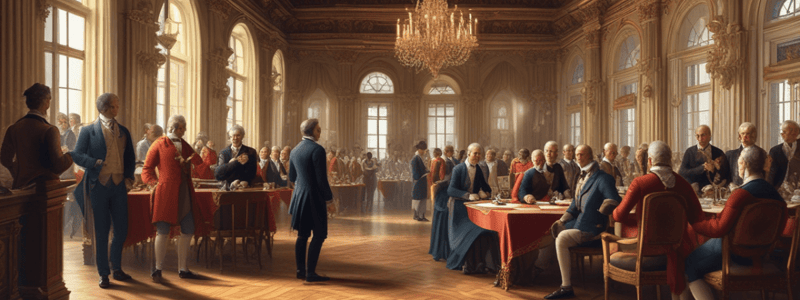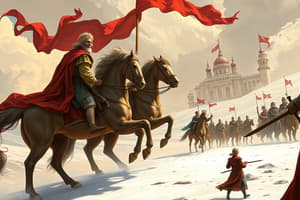Podcast
Questions and Answers
What major powers were involved in the Congress of Vienna?
What major powers were involved in the Congress of Vienna?
- Belgium, Hungary, Denmark, and Poland
- France, Italy, Spain, and Germany
- Turkey, Sweden, Netherlands, and Portugal
- Austria, Prussia, Russia, and Great Britain (correct)
Why did the Congress of Vienna establish new boundaries in Europe?
Why did the Congress of Vienna establish new boundaries in Europe?
- To abolish monarchies
- To encourage local autonomy
- To promote religious freedom
- To create multinational empires (correct)
Who used military force to crush revolts in Italy and Spain after the Congress of Vienna?
Who used military force to crush revolts in Italy and Spain after the Congress of Vienna?
- Allied Powers (France, Russia, UK)
- Triple Entente (France, Russia, UK)
- Quadruple Alliance (Austria, Great Britain, Russia, and Prussia) (correct)
- Central Powers (Germany, Austria-Hungary, Ottoman Empire)
What did the liberals oppose during the Congress of Vienna?
What did the liberals oppose during the Congress of Vienna?
What led to centralized systems of governance and equal rights through constitutions in Europe?
What led to centralized systems of governance and equal rights through constitutions in Europe?
Why did some Russians seek support for radical ideas like those of Karl Marx after Tsar Alexander II's reforms?
Why did some Russians seek support for radical ideas like those of Karl Marx after Tsar Alexander II's reforms?
What led to the mass migration of Jews out of Russia during Alexander III's reign?
What led to the mass migration of Jews out of Russia during Alexander III's reign?
What event sparked the Revolution of 1905 in Russia?
What event sparked the Revolution of 1905 in Russia?
What was the impact of the Treaty of Kanagawa signed between Japan and the United States in 1854?
What was the impact of the Treaty of Kanagawa signed between Japan and the United States in 1854?
What was a key outcome of the Meiji Restoration in Japan?
What was a key outcome of the Meiji Restoration in Japan?
Which event in France directly led to the rise of Louis-Philippe as the 'citizen king'?
Which event in France directly led to the rise of Louis-Philippe as the 'citizen king'?
How did Louis-Philippe's policies reflect liberal principles?
How did Louis-Philippe's policies reflect liberal principles?
Which of the following statements about the British middle class in the late 18th century is true?
Which of the following statements about the British middle class in the late 18th century is true?
What was a key demand of the Chartist movement in Britain?
What was a key demand of the Chartist movement in Britain?
Which of the following reforms was not achieved through the gradual changes in British laws during the liberal movements?
Which of the following reforms was not achieved through the gradual changes in British laws during the liberal movements?
Which group in Saint-Domingue was at the bottom of the social hierarchy?
Which group in Saint-Domingue was at the bottom of the social hierarchy?
What inspired the affranchis, or free people of color, to seek increased rights?
What inspired the affranchis, or free people of color, to seek increased rights?
What was Toussaint Louverture's primary contribution to the Haitian Revolution?
What was Toussaint Louverture's primary contribution to the Haitian Revolution?
What was Napoleon's response to Toussaint Louverture's increasing independence for Saint-Domingue?
What was Napoleon's response to Toussaint Louverture's increasing independence for Saint-Domingue?
Who declared the colony's independence from France and named it Haiti?
Who declared the colony's independence from France and named it Haiti?
What was the primary goal of Otto von Bismarck in unifying Germany?
What was the primary goal of Otto von Bismarck in unifying Germany?
What was the role of the Zollverein in the German unification process?
What was the role of the Zollverein in the German unification process?
How did Bismarck achieve German unification?
How did Bismarck achieve German unification?
What was the role of the Carbonari in the Italian unification movement?
What was the role of the Carbonari in the Italian unification movement?
What was the primary cause of the Armenian Genocide in the Ottoman Empire?
What was the primary cause of the Armenian Genocide in the Ottoman Empire?
What was one of the primary reasons European colonial powers and the United States did not recognize Haiti's independence in the early 1800s?
What was one of the primary reasons European colonial powers and the United States did not recognize Haiti's independence in the early 1800s?
What significant event in Mexico marked the start of the independence movement in Spanish colonies?
What significant event in Mexico marked the start of the independence movement in Spanish colonies?
Which of the following statements about the independence movement in South America is true?
Which of the following statements about the independence movement in South America is true?
Which of the following statements accurately describes the social hierarchy in Spanish colonies?
Which of the following statements accurately describes the social hierarchy in Spanish colonies?
Which of the following statements accurately describes the economic situation in Haiti after its independence?
Which of the following statements accurately describes the economic situation in Haiti after its independence?
What was the primary economic activity in Brazil during the 19th century?
What was the primary economic activity in Brazil during the 19th century?
What was the key difference between Portuguese rule in Brazil compared to Spanish rule in other Latin American colonies?
What was the key difference between Portuguese rule in Brazil compared to Spanish rule in other Latin American colonies?
What event led to the Portuguese royal family fleeing to Brazil in 1807?
What event led to the Portuguese royal family fleeing to Brazil in 1807?
What was the primary reason for the unpopularity of Emperor Pedro I's rule in Brazil?
What was the primary reason for the unpopularity of Emperor Pedro I's rule in Brazil?
What was the impact of independence wars, political instability, and free trade with foreign merchants on the new Latin American economies?
What was the impact of independence wars, political instability, and free trade with foreign merchants on the new Latin American economies?
What was the role of European investors in the Latin American economy after independence?
What was the role of European investors in the Latin American economy after independence?
What was the primary social division in Brazilian society during the 19th century?
What was the primary social division in Brazilian society during the 19th century?
What was the impact of the 1889 coup that removed the monarchy in Brazil?
What was the impact of the 1889 coup that removed the monarchy in Brazil?
What was the primary reason for the continued social unrest in Brazil in the 1920s and 1930s?
What was the primary reason for the continued social unrest in Brazil in the 1920s and 1930s?
What was the key factor that enabled Brazil to take a different path to independence compared to other Latin American countries?
What was the key factor that enabled Brazil to take a different path to independence compared to other Latin American countries?
Flashcards are hidden until you start studying




